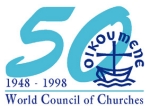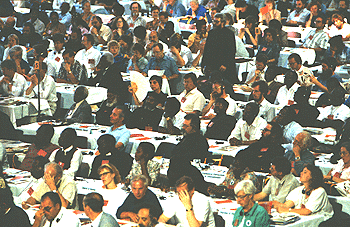

No. 11
 |
WCC Anniversary and Eighth Assembly |

|
|
Feature Service No. 11 | ||
 en français
en français  auf Deutsch
auf Deutsch  en español
en español
What can be expected from this forthcoming assembly? What is likely to be its outcome? Some events during recent months have raised concerns that the assembly might be disrupted by conflicts which could not only affect its business agenda but seriously disturb the celebration of the anniversary.
Many WCC member churches, particularly in Europe and North America, have in recent years been confronted with pressures from within to define or review their position regarding questions of sexual orientation. The most recent example is the debate which took place at the Lambeth Conference of Anglican bishops in July and August of this year. Most member churches in Africa and other parts of the Southern hemisphere, as well as Orthodox churches, are not willing or prepared to enter this discussion. Therefore, no serious work on the subject has taken place so far in the World Council of Churches. We are far from a sufficiently common understanding of the issues involved and this fact alone excludes the possibility that the assembly should take any action in this regard. At the Lambeth Conference the matter was part of the official agenda; this will not be the case at the WCC assembly.
The Harare assembly will, however, open up its programme during five days to contributions and offerings from member churches, ecumenical organizations and groups who are invited to share their experiences of ecumenical work and their expectations regarding the future of the ecumenical movement. The offerings have been grouped in six thematic streams but the responsibility for content and form remains with the initiators. This open space, called Padare (a Shona word meaning meeting place), is an integral part of the assembly but is not part of the official business agenda. In thePadare, delegates will be invited to share in the various presentations alongside other participants and in this way sharpen their perception of the mandate which they will be required to give to the WCC for the period ahead. A small number of offerings will address the questions of human sexuality and sexual orientation, either as issues of justice and human rights or with regard to the inclusive character of the Christian community. Padare is an exciting new feature in the programme of a WCC assembly and great care has been taken to clarify the "rules of the game" in order to enable it to be an occasion for exchange and learning from one another rather than a time of provocation and confrontation. A Padareadvisory group has been formed to monitor the process and to mediate in case of conflict.
The example of previous assemblies shows that this kind of large international, ecumenical gathering attracts conflict. This risk cannot be avoided. However, the Council has so far shown sufficient maturity to handle conflict in the spirit of mutual understanding and respect. The Harare assembly will be no exception from this established tradition.
But will the assembly leave its mark in the history of the ecumenical movement? Will it be able to provide new and challenging directions? Several features stand out which promise to make this a distinct event.
First, it is 22 years since the last assembly of the WCC gathered in Africa. The Fifth Assembly in Nairobi in 1975 took place in the midst of the liberation struggles, particularly in the Southern African region including Zimbabwe. Since then, the end of the apartheid regime in South Africa has ushered in a new period in the post-colonial history of Africa. However, what was expected to become a period of reconstruction and rebuilding, particularly with respect to the community of African people, has turned into a scene of unending internal conflicts. In this situation, great responsibility now falls on the African churches as the trustees of a message of justice, peace and sustainable community.
Many are talking about the fact that on the eve of the 21st century the ecumenical movement finds itself at a crossroads. The ecumenical pilgrimage has reached a point where the way ahead is unclear. The earlier efforts of churches, mainly from the Anglo-Saxon Protestant traditions, to achieve unity by institutional, organic union have almost come to a standstill. The intensive doctrinal conversations between churches and church families over the past three decades have not been able to achieve communion and the churches are struggling with the task of receiving the agreements which call for a reassessment of their traditional identity.
Neither organic union nor doctrinal consensus in themselves seem to provide the answer to the search for visible unity. The assembly theme Turn to God - Rejoice in Hope is an invitation to the churches in the spirit of the jubilee to be released from institutional and doctrinal captivity. It is an invitation to conversion, to a turning around in order to be able to move again. The present captivity and defensiveness of the churches is rooted in histories of division containing many memories of hurt and shame. These histories have not been reconciled. The offer of Godís jubilee carries the message of forgiveness. Godís jubilee can liberate the churches from being tied to their past and open the way into the future.
Earlier this century, when the generation of ecumenical pioneers formulated their vision, it energized and liberated church leaders, lay and ordained, to engage in a process of ecumenical renewal. Much has been achieved in the decades since then. Does the ecumenical vision still provide orientation for the people of God on the way together? At the Harare assembly, following the celebration of our jubilee anniversary, delegates will be invited to express a renewed commitment to the ecumenical movement on behalf of their churches. The order of service in which this commitment will be made says this about the ecumenical vision:
young and old, women and men, lay and ordained.
and breaking the spiral of violence.
and seeking encounter with those of other faiths.
In less than three months, following its closing service, the Eighth Assembly of the World Council of Churches will have ended. During the three final days, 12-14 December, the assembly will receive, discuss and act upon the reports from committees and give direction to the future work of the World Council. Proceedings on this concluding business agenda of the assembly will stop on Sunday, 13 December for a special programme of events to commemorate the 50th anniversary of the Council which was founded in August 1948 at the first assembly in Amsterdam.We long for the visible oneness of the body of Christ,
affirming the gifts of all,
We expect the healing of human community,
the wholeness of Godís entire creation.
We trust in the liberating power of forgiveness,
transforming enmity into friendship
We open ourselves for a culture of dialogue and solidarity,
sharing life with strangers
This affirmation is a challenge both to the churches and to the Council. The way in which the assembly will handle the potential conflicts of a political, ecclesial and moral nature will show how far the member churches and the WCC as an organized body are prepared to live up to this vision. This could become the strongest message of the assembly.

A plenary session during the 1991 assembly in Canberra - one expression of the fellowship of churches that is the WCC.
Is this vision strong enough to guide churches in their quest to be more truly church, and to be and become for the world that space where reconciliation is experienced as a reality? The central focus of this vision statement is a new quality of life and relationships in community. With this emphasis the vision statement echoes and translates what a recent policy document has affirmed as the fundamental understanding of the WCC itself, viz. to be a fellowship of churches where the churches accept mutual responsibility for each other.
Radio journalists please note that for interview purposes we have an ISDN line installed in our radio studio using a CCS Codec M66I 64K.
Use of the article must credit Konrad Raiser as author. Editors are free to shorten the article if they wish but this should be acknowledged. Please send a copy of anything you publish for our records. Thank you.
The photographs to accompany this article are available upon request. Use of the photographs is free when used with the article. Other use will attract the usual WCC fees.
Good quality reproductions of the photos are available via Internet or ordinary mail. To order a photo via Internet, just click on it. When you have located your photo, complete the online order form. Photo Oikoumene will send the photo electronically as an attached file, at 300dpi resolution, JPEG format.
If you want a colour slide, or colour or b/w photo by ordinary mail, send an E-mail inquiry to photo
Please also feel free to download the Assembly and 50th Anniversary logos directly from this page, or contact us if you wish us to airmail them to you.
John Newbury
Press & Information Officer
P.O. Box 2100
1211 Geneva 2, Switzerland
Tel.: (+41 22) 791 6152/51
Fax: (+41 22) 798 1346
E-mail: media
 Feature Service list
Feature Service list
 8th Assembly & 50th Anniversary homepage
8th Assembly & 50th Anniversary homepage
 Press Release list
Press Release list
 WCC homepage
WCC homepage